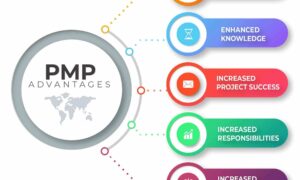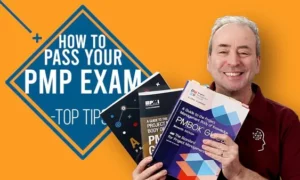Before delving deep into the discussion of PMP Certified Professionals, let’s first know What is PMP.
PMP (Project Management Professional) certification is a widely recognized and highly valued certification for project managers. The PMP certification is offered by the Project Management Institute (PMI) and is designed to demonstrate a project manager’s knowledge and experience in leading and directing projects.
The PMP certification is based on PMI’s Guide to the Project Management Body of Knowledge (PMBOK). It is intended for project managers who have demonstrated their expertise in leading and directing projects. For PMP certification, you need a combination of education and experience, as well as passing a rigorous exam.
Benefits of PMP Certification
PMP certification provides several benefits to project managers and their organizations, including:
- Increased credibility and recognition in the project management community
- Improved job opportunities and higher earning potential
- Enhanced skills and knowledge in project management
- Better alignment with industry best practices and standards
- Improved ability to lead and direct complex projects
Eligibility Requirements for PMP Certification
To be eligible for PMP certification, candidates must meet specific education and experience requirements and pass the PMP exam.
- Education Requirements
- Candidates for PMP certification must have a secondary degree and
Either:
- 7,500 hours of directing projects and leading them with 35 hours of education in project management
Or:
- 4-year degree and 4,500 hours of directing projects and leading them, and 35 hours of project management education
- Project Management Experience Requirements
Candidates must have experience leading and directing projects, which include:
- Defining the project charter
- Developing the project management plan
- Directing and managing project work
- Monitoring and controlling project work
- Closing the project
- Exam Requirements
In addition to meeting the education and experience requirements, candidates must pass the PMP exam. The PMP exam consists of 200 MCQs and must be completed within four hours.
Preparing for the PMP Exam
To prepare for the PMP exam, candidates should take advantage of PMP study materials, PMP exam preparation courses, and PMP practice exams.
- PMP Study Materials
Candidates can access PMI’s PMBOK guide and other PMP study materials, such as PMP exam prep books and flashcards, to help prepare for the exam.
- PMP Exam Preparation Courses
PMP exam preparation courses provide comprehensive instruction and guidance on PMP concepts and best practices. Many courses also offer interactive practice exams and study aids to help candidates prepare for the PMP exam.
- PMP Practice Exams
Practice exams provide a way for candidates to assess their understanding of PMP concepts and identify areas where they need additional study. Practice exams also provide an opportunity to familiarise themselves with the format and pacing of the PMP exam.
Taking the PMP Exam
To take the PMP exam, candidates must schedule and pay for their exam through PMI’s website.
- PMP Exam Format
The PMP exam consists of 200 MCQs and must be completed within four hours. The questions on the PMP exam cover PMI’s PMBOK guide and test candidates’ knowledge and understanding of PMP concepts and best practices.
- PMP Exam Day Preparation
On the day of the PMP exam, candidates should arrive at the testing centre early and bring two forms of government-issued identification, as well as their PMI membership number.
- PMP Exam Scoring and Results
The PMP exam is scored based on the number of correct answers, also known as a “raw score.” The raw score is then transformed into a scaled score ranging from 200 to 800. The passing score for the PMP exam is set at 450.
Maintaining PMP Certification
Maintaining PMP certification is important for ensuring that certified professionals remain knowledgeable and up-to-date with the latest best practices in project management.
- Continuing Education Requirements
PMI requires PMP certified professionals to earn 60 professional development units (PDUs) every three years to maintain their certification. PDUs can be earned through various activities, such as attending conferences and workshops, participating in online courses, and volunteering in the project management community.
- PMP Recertification Process
To maintain their certification, PMP certified professionals must complete the PMP recertification process every three years. Recertification involves reporting PDUs earned and paying an annual maintenance fee to PMI.
Conclusion
PMP certification is a valuable asset for project managers looking to advance their careers and demonstrate their expertise in the field. Following the steps outlined in this blog, project managers can take the steps needed to become PMP certified and maintain their certification over time.
In conclusion, PMP certification is a worthwhile investment for project managers looking to stay current and competitive. The knowledge and skills gained through the PMP certification process are valuable for personal and professional growth. They can lead to greater success and recognition in the project management field.



































